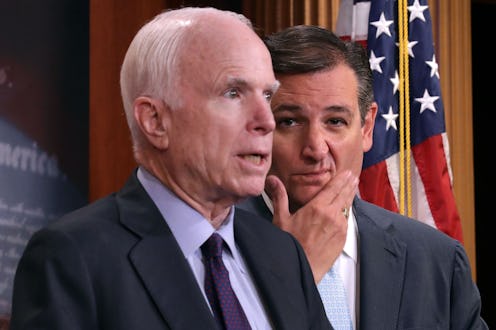News
How Trumpcare Would Affect The Cost Of John McCain's Surgery

Arizona Sen. John McCain's office announced on Wednesday that he was diagnosed with brain cancer after a tumor was discovered following his surgery to remove a blood clot on Friday. Observing whether McCain's surgery would be covered under Trumpcare offers some much-needed insight into the repercussions the health care plan could evoke on the average citizen. Considering all we don't know about McCain's condition, the answer is a little bit complicated.
As ThinkProgress' Zack Ford noted, shortly after McCain's office first released word of his surgery, the initial clot (which ultimately led to the tumor being discovered) was found during a routine physical . That kind of physical is the sort of preventative care that has been expanded under the Affordable Care Act (ACA) and is on the chopping block under Trumpcare. Already, many uninsured Americans go without those routine checkups.
Secretary of Health and Human Services Tom Price said the Republican plan would essentially call for insurance companies to return to pre-Obamacare business as usual. This means health insurers would be allowed to once again sell insurance plans that do not cover the 10 "essential health benefits" outlined in Obamacare's requirements. Those requirements, again, were a huge reason more Americans stopped skipping the visits to the doctor.
McCain's procedures, so far, already have an intimidating price tag. Vox estimated that his care would cost an uninsured American about $76,000, with average Medicare payments ranging from $25,932 to $33,958. Considering the estimated millions of people who would been left without insurance under Trumpcare over the next decade, the plan could leave countless Americans in McCain's situation in the lurch.
Additionally, Sen. McCain's previous experience with melanoma could also put him in the category of Americans with preexisting conditions who, under Trumpcare, would be at risk of being charged higher premiums. As the Kaiser Family Foundation noted in its list of pre-existing conditions, "Cancer within some period of time" was on the list of "Declinable Conditions In the Medically Underwritten Individual Market, Before the Affordable Care Act."
While McCain himself never fully committed to supporting the Republican bill, he remained critical of Obamacare and just about any plan birthed entirely from one side of the political spectrum. As he said in a statement on Tuesday, following word that Sens. Mike Lee and Jerry Moran wouldn't support the bill:
One of the major problems with Obamacare was that it was written on a strict party-line basis and driven through Congress without a single Republican vote. As this law continues to crumble in Arizona and states across the country, we must not repeat the original mistakes that led to Obamacare's failure. The Congress must now return to regular order, hold hearings, receive input from members of both parties, and heed the recommendations of our nation's governors so that we can produce a bill that finally provides Americans with access to quality and affordable health care.
While the future of Trumpcare remains in arrested development for the time being, McCain's situation may offer a new perspective on the realities of receiving affordable healthcare in the United States.